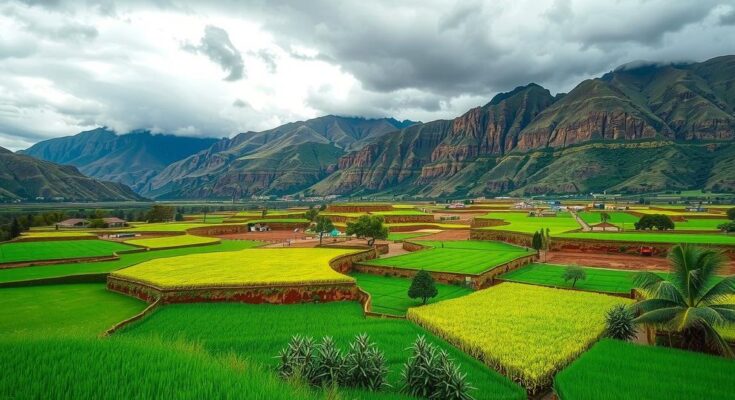A Peruvian farmer is suing German energy giant RWE for its role in glacier melting that threatens his home. The case seeks to enforce corporate accountability for emissions and secure funding for climate adaptation efforts. Legal experts highlight its potential to set a precedent in climate litigation.
A Peruvian farmer has initiated a landmark legal case against the German energy company RWE, asserting that the firm’s emissions are contributing to the melting of Andean glaciers, which heightens the flood risk to his property. The German court’s hearings may create a precedent for future climate lawsuits, enabling the accountability of corporations for historical emissions and facilitating funding for climate adaptation in vulnerable communities.
Saul Luciano Lliuya, backed by the advocacy organization Germanwatch, is seeking approximately 21,000 euros (about $23,000) to support a flood defense project valued at $3.5 million. He contends that RWE is responsible for nearly 0.5% of global anthropogenic emissions since the onset of the industrial revolution and ought to assume a proportionate share of the costs associated with climate change.
Sebastien Duyck, a senior attorney with the Center for International Environmental Law, remarked that this case is being closely monitored for its potential to establish significant legal precedents. The contributions expected from industrialized nations toward mitigating climate change effects have been subjects of contentious debate at U.N. climate summits, particularly highlighted at COP29 in Baku.
Harjeet Singh, the founding director of the Satat Sampada Climate Foundation, suggested that cases like Lliuya’s might pave the way for innovative funding sources aimed at assisting those affected by climate change. He noted the importance of holding accountable those companies responsible for the crisis.
RWE contends that a single emitter cannot bear sole responsibility for global warming. The company stated, “If such a claim were to exist under German law, it would also be possible to hold every motorist liable.”
The litigation originated in 2015 in Essen, Germany, but was initially dismissed. In 2017, it was allowed to proceed by the Higher Regional Court of Hamm. The court’s responsibility includes establishing whether glacier melt is causing rising water levels in Lake Palcacocha, which may pose a direct risk to Lliuya’s residence in Huaraz over the ensuing 30 years.
Court-appointed experts visited the site in 2022, and their findings will be reviewed during the two-day hearings. Lukas Arenson, a geotechnical expert, indicated that while the report assessed ice avalanche impacts, it may have underestimated the risk posed by rockslides from permafrost regions.
Should the court determine a specific flooding threat to Lliuya’s home, it will further investigate the relationship between climate change, greenhouse gas emissions, and the melting of Andean glaciers, a process that could extend over two years. Climate scientist Friederike Otto cited evidence supporting the notion that glacier retreat is contingent upon climate change.
Roda Verheyen, representing Lliuya, expressed optimism that the court’s decision to hear the case represents a significant victory. “Saul … had very little to no hope that this would get anywhere. And now we’re all here.”
The climate lawsuit initiated by Saul Luciano Lliuya against RWE represents a pivotal moment in climate litigation, with the potential to hold companies accountable for their historical emissions and fund adaptation efforts in vulnerable areas. As the court proceeds to evaluate the dangers posed by glacial melting and the role of emissions in these changes, the ruling may shape future accountability and environmental justice related to climate change.
Original Source: kfgo.com




